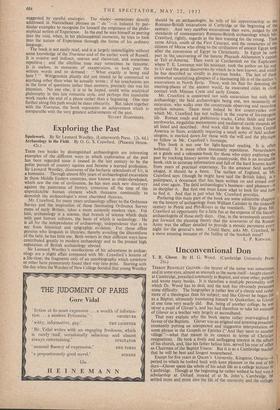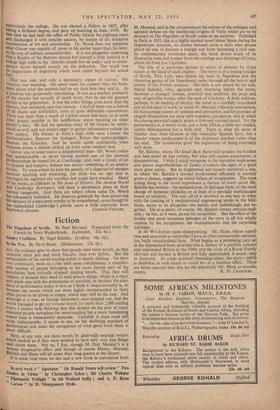Unconventional Don
TERROT REAVELEY GLOVER—the bearer of the name was sometimes, and in some eyes, almost as uncouth as the name itself—taught classics at Cambridge, preached constantly in Baptist, and some other, pulpits, and wrote many books. It is therefore a multiple personality with which Dr. Wood has to deal, and the task has obviously presented some difficulty. The biographer is rather less of a classic and rather more of a theologian than his subject; and like Glover he began life as a Baptist, ultimately translating himself to Quakerism, as Glover at one time very nearly did. But, being of another college, he was never a pupil of Glover's, and has had therefore to take his estimate of Glover as a teacher very largely at secondhand. That may explain why the book seems rather overweighted in favour of the Baptists. Glover was an original and arresting preacher, constantly putting an unexpected and suggestive interpretation on some phrase in the Gospels or Epistles ("And they went to another village"—what that meant in its context in terms of Christian resignation). He took a lively and unflagging interest in the affairs of his church, and, like his father before him, served his year,of office as Chairman of the Baptist Union: But it is as a Cambridge teacher that he will be best and longest remembered.
Except for five years at Queen's University, Kingston, Ontario-5 period to which he looked back with keen pleasure to the end of his days—Glover spent the whole of his adult life as a college lecturer in Cambridge. Though at the beginning he rather wished he had won a scholarship at Oxford instead of at St. John's, Cambridge, he settled more and more into the life of the university and the college, Particularly the college. He was elected a Fellow in 1892, after taking a brilliant degree, and gave up teaching in June, 1939. By that time he had held the office of Public Orator for eighteen years and discharged it with notable success, by reason of his attractive combination of wit and scholarship. Dr. Wood does not minimise what Glover was capable of, more in his earlier years than his later, In the way of militant nonconformity. It is not altogether surprising that a Baptist of the Baptists should feel himself a little isolated at a College high table in the 'nineties (much less So today) and in conse- quence throw himself unduly on the defensive. The result was an fact appearance of angularity which went rather beyond the actual That was one, and only a secondary, aspect of Glover. His vocation was teaching. He cared more for content than for form, more about what the ancients had to say than how they said it. As a result he was perpetually stimulating. it was as a teacher, primarily of the classics but actually of much more, that he did the greatest service to his generation. It was the other things, even more than the classics, that mattered, and that remain. Chief of them was a hatred 2,f all shams and artificiality, even of quite defensible conventions. There was more than a touch of Carlyle about him here, as at some ether points, notably in his indifference about treading on other People's toes. He had the questing mind of the Greeks he under- stood so well, and was always eager to gather information outside his own subject. His friends at John's high table were Larmor the Mathematician, Bateson the biologist, Rivers the anthropologist, Benians the historian. And he would quote confidently, when occasion arose, a dictum picked up from some medical don. - Glover was to some extent a disappointed man—Dr. Wood makes that unmistakable—in never having secured one of the classical Professorships he hoped for at Cambridge; and, with a family of six to educate and support, finance was always something of an anxiety to him. To some extent he paid the penalty of a dispersal 'of energies between teaching and preaching, but there was no sign that in retrospect he regretted any sacrifice that might have entailed. Many of his books, as different as The Jesus of History, The Ancient World and Cambridge Retrospect, will have a permanent place in their v, armus categories. And there are others whose value Dr. Wood has adequately indicated. He deserves gratitude for thus preserving the memory of a man most worthy to be remembered—even though he has replenished Cambridge's pocula sacra a little copiously from



































 Previous page
Previous page